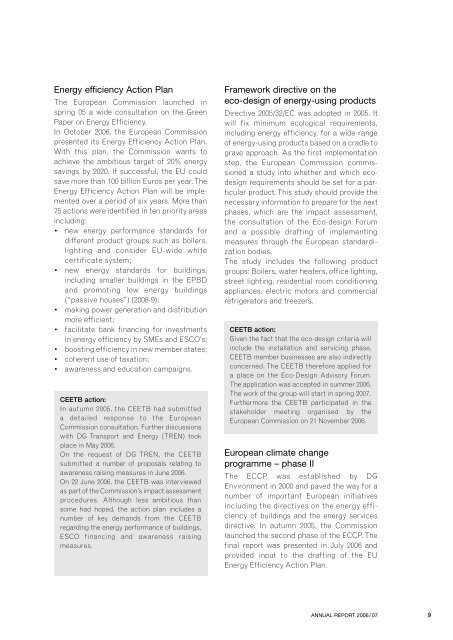Annual Report GCI UICP - ceetb
Annual Report GCI UICP - ceetb
Annual Report GCI UICP - ceetb
Create successful ePaper yourself
Turn your PDF publications into a flip-book with our unique Google optimized e-Paper software.
Energy efficiency Action Plan<br />
The European Commission launched in<br />
spring 05 a wide consultation on the Green<br />
Paper on Energy Efficiency.<br />
In October 2006, the European Commission<br />
presented its Energy Efficiency Action Plan.<br />
With this plan, the Commission wants to<br />
achieve the ambitious target of 20% energy<br />
savings by 2020. If successful, the EU could<br />
save more than 100 billion Euros per year. The<br />
Energy Efficiency Action Plan will be implemented<br />
over a period of six years. More than<br />
75 actions were identified in ten priority areas<br />
including:<br />
• new energy performance standards for<br />
different product groups such as boilers,<br />
lighting and consider EU-wide white<br />
certificate system;<br />
• new energy standards for buildings,<br />
including smaller buildings in the EPBD<br />
and promoting low energy buildings<br />
(“passive houses”) (2008-9);<br />
• making power generation and distribution<br />
more efficient;<br />
• facilitate bank financing for investments<br />
in energy efficiency by SMEs and ESCO’s;<br />
• boosting efficiency in new member states;<br />
• coherent use of taxation;<br />
• awareness and education campaigns.<br />
CEETB action:<br />
In autumn 2005, the CEETB had submitted<br />
a detailed response to the European<br />
Commission consultation. Further discussions<br />
with DG Transport and Energy (TREN) took<br />
place in May 2006.<br />
On the request of DG TREN, the CEETB<br />
submitted a number of proposals relating to<br />
awareness raising measures in June 2006.<br />
On 22 June 2006, the CEETB was interviewed<br />
as part of the Commission’s impact assessment<br />
procedures. Although less ambitious than<br />
some had hoped, the action plan includes a<br />
number of key demands from the CEETB<br />
regarding the energy performance of buildings,<br />
ESCO financing and awareness raising<br />
measures.<br />
Framework directive on the<br />
eco-design of energy-using products<br />
Directive 2005/32/EC was adopted in 2005. It<br />
will fix minimum ecological requirements,<br />
including energy efficiency, for a wide range<br />
of energy-using products based on a cradle to<br />
grave approach. As the first implementation<br />
step, the European Commission commissioned<br />
a study into whether and which ecodesign<br />
requirements should be set for a particular<br />
product. This study should provide the<br />
necessary information to prepare for the next<br />
phases, which are the impact assessment,<br />
the consultation of the Eco-design Forum<br />
and a possible drafting of implementing<br />
measures through the European standardization<br />
bodies.<br />
The study includes the following product<br />
groups: Boilers, water heaters, office lighting,<br />
street lighting, residential room conditioning<br />
appliances, electric motors and commercial<br />
refrigerators and freezers.<br />
CEETB action:<br />
Given the fact that the eco-design criteria will<br />
include the installation and servicing phase,<br />
CEETB member businesses are also indirectly<br />
concerned. The CEETB therefore applied for<br />
a place on the Eco-Design Advisory Forum.<br />
The application was accepted in summer 2006.<br />
The work of the group will start in spring 2007.<br />
Furthermore the CEETB participated in the<br />
stakeholder meeting organised by the<br />
European Commission on 21 November 2006.<br />
European climate change<br />
programme – phase II<br />
The ECCP was established by DG<br />
Environment in 2000 and paved the way for a<br />
number of important European initiatives<br />
including the directives on the energy efficiency<br />
of buildings and the energy services<br />
directive. In autumn 2005, the Commission<br />
launched the second phase of the ECCP. The<br />
final report was presented in July 2006 and<br />
provided input to the drafting of the EU<br />
Energy Efficiency Action Plan.<br />
ANNUAL REPORT 2006 / 07 9


